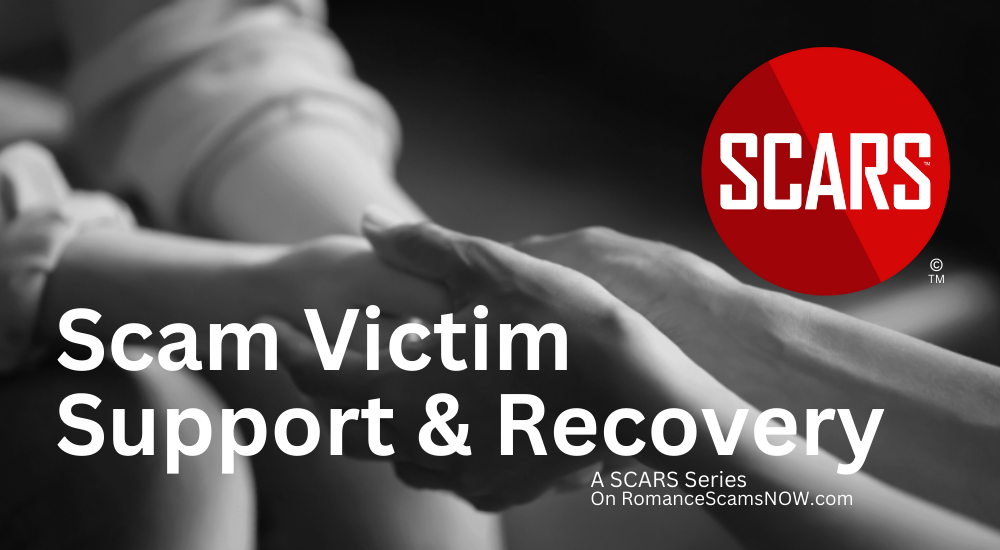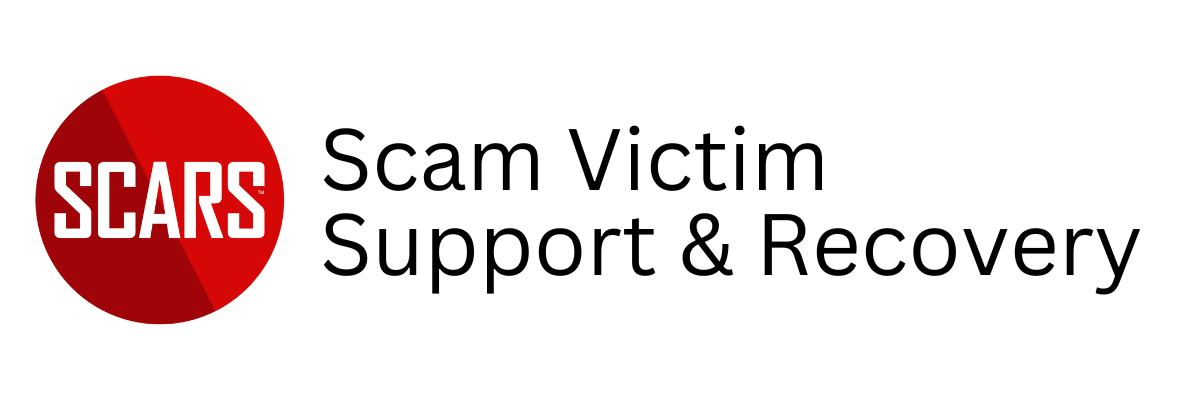Author:
• Tim McGuinness, Ph.D. – Anthropologist, Scientist, Director of the Society of Citizens Against Relationship Scams Inc.
Article Abstract
The article underscores the imperative of comprehending scams for scam victims. Understanding the diverse forms of scams, from email phishing to relationship scams, is crucial for effective defense and recovery.
Education is emphasized to empower scam victims, shedding self-blame and guilt. Unraveling manipulation techniques employed by scammers, particularly in relationship scams, is essential to build resilience against emotional exploitation. The psychological recovery journey for victims, including addressing trauma, rebuilding trust, and seeking professional counseling, is explored. SCARS Support & Recovery Groups play a pivotal role in fostering connections and aiding victims. Empowering through education, both preventive and post-scam is very important for rebuilding vigilance and resiliency for scam victims in the face of evolving scams.
Understanding these Crimes is Essential to Scam Victims’ Recovery
SCARS is the Global Leader in Scam Victims’ Advocacy & Assistance, Services & Support, Learning & Education
The Imperative of Understanding Scams and Empowering Scam Victims
Introduction
In the digital age, where connectivity thrives, scam victims pay the price for the prevalence of every imaginable type of scam.
Whether in the form of phishing emails, fraudulent investments, or, more insidiously, relationship scams that demolish scam victim’s trust – in others and in themselves, the need for awareness and education is paramount to avoid these crimes, discover them in progress, and to fully recover from them.
The importance of learning about scams, their intricate workings, the manipulation techniques employed by scammers, and the psychological recovery journey for victims, especially those ensnared in relationship scams is critical.
Understanding Scams
To combat scams effectively, one must first comprehend their diverse forms. From classic email phishing to elaborate relationship scams or even combinational types like cryptocurrency investment scams, scammers exploit human vulnerabilities. Awareness is the first line of defense. Recognizing common scam tactics, such as urgency, fear, or promises of extraordinary gains, empowers individuals to question and investigate before falling prey.
Education is also an essential component in understanding so that victims can shed their self-blame, guilt, and shame and allow themselves to recover from their scams.
Understand This!
You are a survivor – you can make it through this process and recover!
It was not your fault – these criminals exploited your vulnerabilities, manipulated and controlled you to get what they wanted!
You are not alone – SCARS is here along with our communities for fellow scam victims-survivors to help you through your recovery from this terrible experience!
Axios – no matter what you think, you are worthy of being helped and we are here to help you!
Unraveling the Manipulation Techniques
Scammers excel at psychological manipulation, particularly in relationship scams. Understanding the tactics they use to exploit emotions – trust, love, fear – is crucial. By feigning affection, creating a false sense of urgency, or even threatening harm, scammers manipulate victims into making irrational decisions. Awareness of these tactics serves as armor, fostering resilience against emotional exploitation.
The Psychology of Recovery for Relationship Scam Victims
The aftermath of falling victim to a relationship scam can be devastating. Victims often grapple with shame, guilt, and profound emotional & psychological trauma. Recognizing the psychological impact is the first step towards recovery. Establishing a support system, through SCARS Support & Recovery Groups, friends, family, and professional counselors, is vital. Victims must understand that they are not alone, and seeking help is a sign of strength.
Rebuilding Trust
One of the significant challenges for scam victims, particularly in relationship scams, is rebuilding trust. Betrayed by someone they thought cared for them, victims may become skeptical of genuine connections. Patience, self-reflection, and seeking healthy relationships are essential in the journey toward rebuilding trust. SCARS Support & Recovery Group communities help rebuild real connections between survivors who share common experiences.
Addressing Scam Victims’ Trauma
Victims of relationship scams often experience profound emotional trauma. Understanding that healing is a process and seeking professional counseling can be transformative. Therapeutic approaches, such as cognitive-behavioral therapy, can aid victims in coping with the emotional aftermath, fostering resilience and preventing long-term psychological scars.
SCARS is not a mental healthcare provider but is trauma-informed care certified to help scam victims overcome their experience through learning, support, and advocacy.
Empowering Scam Victims Through Education
Prevention is undeniably the best cure when it comes to scams. Educational initiatives, both formal and informal, can empower individuals to recognize red flags, question suspicious activities, and report scams. Government agencies, non-profit organizations, and educational institutions play pivotal roles in disseminating information and fostering a culture of vigilance.
However, it is just as important after the scam ends, since this can help prevent another scam, but also to enable complete understanding about why it was not the victim’s fault and how to move forward.
Remember
As scams continue to evolve in sophistication, so must our collective defense mechanisms. Learning about scams, understanding their intricacies, recognizing manipulation techniques, and supporting victims in their recovery are crucial elements of this defense. By fostering awareness and promoting education, we can build a resilient society that navigates the digital landscape with confidence and security.
Sign up for SCARS Scam Victims’ Support & Recovery Groups
Every scam victim can recover from this experience – it is your responsibility to make sure that you are one of them.
Sign up for SCARS groups by visiting support.AgainstScams.org
Our team will walk you through the process of determining what the best solution is for each victim.
Trauma Counseling
SCARS recommends that every scam victim obtain trauma counseling or therapy to help them effectively recover from these crimes. There is no shame in asking and accepting help, the only shame is in not getting help when you need it.
You can find a counselor or therapist in our directories at counseling.AgainstScams.org
SCARS also offers a very low-cost membership that includes a counseling/therapy benefit through our partners. Learn more about this at membership.AgainstScams.org
Begin Learning
The learning journey starts are RomanceScamsNOW.com and ScamsNOW.com where there is the largest collection of knowledge about what these crimes are, how they work, who the criminals are, and how to recover from them!
Please Report the Crime
Reporting may be difficult but it is absolutely necessary for every scam victims’ recovery. To learn where and how go to reporting.AgainstScams.org
Important Information for New Scam Victims
- Please visit www.ScamVictimsSupport.org – a SCARS Website for New Scam Victims & Sextortion Victims
- Enroll in FREE SCARS Scam Survivor’s School now at www.SCARSeducation.org
- Please visit www.ScamPsychology.org – to more fully understand the psychological concepts involved in scams and scam victim recovery
If you are looking for local trauma counselors please visit counseling.AgainstScams.org or join SCARS for our counseling/therapy benefit: membership.AgainstScams.org
If you need to speak with someone now, you can dial 988 or find phone numbers for crisis hotlines all around the world here: www.opencounseling.com/suicide-hotlines
SCARS Resources:
- Getting Started Right: ScamVictimsSupport.org
- Sextortion Scam Victims: Sextortion Victims Support – The Essentials (scamvictimssupport.org)
- For New Victims of Relationship Scams newvictim.AgainstScams.org
- Subscribe to SCARS Newsletter newsletter.againstscams.org
- Sign up for SCARS professional support & recovery groups, visit support.AgainstScams.org
- Join our Scam Survivors United Chat & Discussion Group facebook.com/groups/scam.survivors.united
- Find competent trauma counselors or therapists, visit counseling.AgainstScams.org
- Become a SCARS Member and get free counseling benefits, visit membership.AgainstScams.org
- Report each and every crime, learn how to at reporting.AgainstScams.org
- Learn more about Scams & Scammers at RomanceScamsNOW.com and ScamsNOW.com
- Scammer photos ScammerPhotos.com
- SCARS Videos youtube.AgainstScams.org
- Self-Help Books for Scam Victims are at shop.AgainstScams.org
- Donate to SCARS and help us help others at donate.AgainstScams.org
- Worldwide Crisis Hotlines: https://blog.opencounseling.com/suicide-hotlines/
Other Cyber Resources
- Block Scam Domains: Quad9.net
- Global Cyber Alliance ACT Cybersecurity Tool Website: Actionable Cybersecurity Tools (ACT) (globalcyberalliance.org) https://act.globalcyberalliance.org/index.php/Actionable_Cybersecurity_Tools_(ACT)_-_Simplified_Cybersecurity_Protection
- Wizer Cybersecurity Training – Free Security Awareness Training, Phishing Simulation and Gamification (wizer-training.com)
-/ 30 /-
What do you think about this?
Please share your thoughts in a comment below!
Do You Need Support?
Get It Now!
SCARS provides the leading Support & Recovery program for relationship scam victims – completely FREE!
Our managed peer support groups allow victims to talk to other survivors and recover in the most experienced environment possible, for as long as they need. Recovery takes as long as it takes – we put no limits on our support!
SCARS is the most trusted support & education provider in the world. Our team is certified in trauma-informed care, grief counseling, and so much more!
To apply to join our groups visit support.AgainstScams.org
We also offer separate support groups for family & friends too.
Become a
SCARS STAR™ Member
SCARS offers memberships in our STAR program, which includes many benefits for a very low annual membership fee!
SCARS STAR Membership benefits include:
- FREE Counseling or Therapy Benefit from our partner BetterHelp.com
- Exclusive members-only content & publications
- Discounts on SCARS Self-Help Books Save
- And more!
To learn more about the SCARS STAR Membership visit membership.AgainstScams.org
To become a SCARS STAR Member right now visit join.AgainstScams.org
To Learn More Also Look At Our Article Catalogs
Scam & Crime Types
More SCARS
- ScamsNOW Magazine – ScamsNOW.com
- ContraEstafas.org
- ScammerPhotos.com
- AnyScam.com – reporting
- AgainstScams.org – SCARS Corporate Website
- SCARS YouTube Video Channel














Leave A Comment